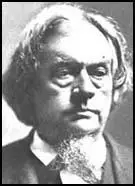Robert Toombs

In 1837 Toombs was elected to the Georgia legislature where he became a strong defender in slavery. A member of the Democratic Party he also served in the House of Representatives (1846-1852) and the Senate (1853-61).
In 1861 Toombs led Georgia to secession. During the American Civil War President Jefferson Davis appointed Toombs as his Secretary of State but in July, 1861 he resigned to join the Confederate Army. A brigadier general, Toombs was seriously wounded at Antietam in 1862. Disappointed by not being promoted, Toombs resigned from the army but joined the Georgia militia when William Sherman was advancing on Atlanta in 1864.
After the war Toombs fled to Cuba and then moved to England. Toombs returned to Georgia in 1867 where he once again established a successful law practice. Robert Toombs, who had a serious drink problem in his later years, died on 15th December, 1885.
Primary Sources
(1) Robert Toombs, speech in the Georgia legislature (13th November, 1860)
In 1790 we had less than 800,000 slaves. Under our mild and humane administration of the system, they have increased about 4 million. The country had expanded to meet the growing want; and Florida, Alabama, Mississippi, Louisiana, Texas, Arkansas, Kentucky, Tennessee, and Missouri have received this increasing tide of African labor; before the end of this century, at precisely the same rate of increase, the Africans among us in a subordinate condition will amount to 11 million persons. What shall be done with them?
We must expand or perish. We are constrained by an inexorable necessity to accept expansion or extermination. Those who tell you that the territorial question is an abstraction, that you can never colonize another territory without the African slave trade are both death and blind to the history of the last sixty years. For twenty years the Abolition societies, by publications made by them, by the public press, through the pulpit and their own legislative halls, and every effort - by reproaches, by abuse, by vilification, by slander - to disturb our security, our tranquillity - to excite discontent between the different classes of our people, and to excite our slaves to insurrection. No nation in the world would submit to such conduct from any other nation. I will not willingly do so from this Abolition Party.
Mr. Lincoln's Republican Party all speak with one voice, and speak trumpet-tongued their fixed purpose to outlaw $4 billion of our property in the territories, and to put it under the ban of the empire in the states where it exists. They declare their purpose to war against slavery until there shall not be a slave in America, and until the African is elevated to a social and political equality with the white man. Lincoln endorses them and their principles, and in his own speeches declares the conflict irrepressible and enduring, until slavery is everywhere abolished.
My countrymen, "if you have nature in you, bear it not." Withdraw yourselves from such a confederacy; it is your right to do so - your duty to do so. I know not why the Abolitionists should object to it, unless they want to torture and plunder you. If they resist this great sovereign right, make another war of independence, for that then will be the question; fight its battles over again - reconquer liberty and independence. as for me, I will take any place in the great conflict for rights which you may assign. I will take none in the federal government during Mr. Lincoln's administration.
